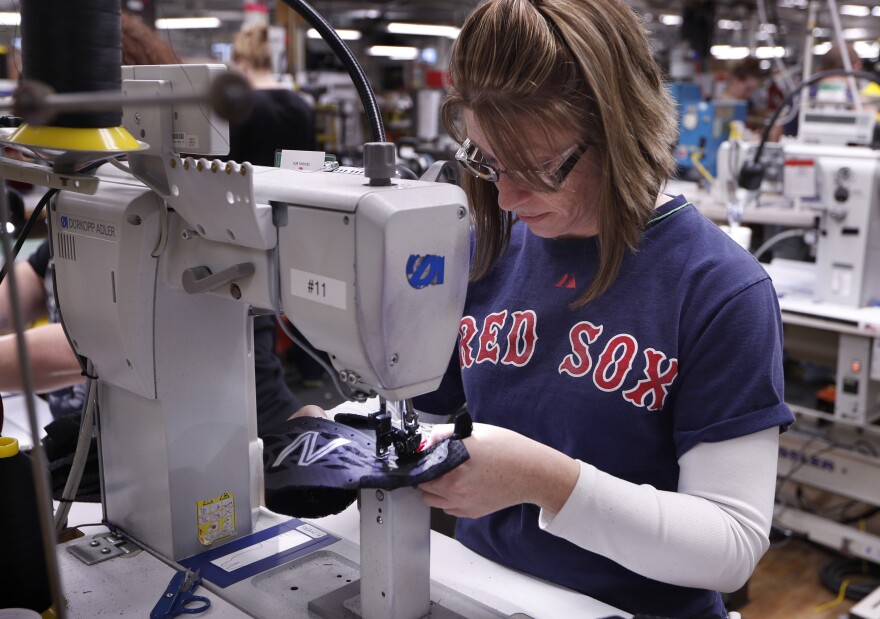The World Bank says the fashion industry is responsible for about 10% of global emissions, leading some brands to take stock of their outsized carbon footprints.
New Balance Athletics operates three factories in Maine and has pledged to be net zero by 2050. The company's factories churn out thousands of sneakers every day.
An MIT lifecycle assessment estimates that producing just one pair of running shoes generates 30 pounds of carbon dioxide emissions. That's because it's an energy intensive process that uses cotton, leather and oil-dependent polyester. It also generates a lot of waste.

This story is part of our series "Climate Driven: A deep dive into Maine's response, one county at a time."
John Stokes, the company's director of sustainability, says New Balance aims to change that.
"The general pathways of reduction are really around energy efficiency and renewable energy in both our own operations but more importantly in the supply chain," Stokes says. "That's where a lot of our emissions are, in that scope 3 supply chain piece."
Stokes says New Balance will use 100% renewable electricity across its domestic and global operations by 2025 and slash its greenhouse gas emissions 50% by 2030. In Maine, four large community solar contracts coming online later this year will help the company meet its goals.
Steve Hudson is an attorney with Preti Flaherty and on the state's Industrial Innovation Task Force, charged with helping businesses in Maine reduce their carbon footprint so the state can be carbon neutral by 2045.
"The state feels we need to hit net zero as a state," Hudson says. "Where we can we reduce emissions while maintaining the kind of jobs that are important across the state, especially in our rural, more economically disadvantaged areas. It's important to do that."
Across its global operations, Stokes says each country's unique infrastructure and regulations dictate how renewable goals will be met. Kurt Kipka is with the Apparel Impact Institute, an organization that assesses manufacturing processes and identifies energy and water savings.
"The industry as a whole has this opportunity to map the entire supply chain to understand where there's hotspots of impact reductions and strategically address those challenges with programs that deliver energy and water savings on a scalable basis," says Kipka.
New Balance says five of its suppliers in China and Taiwan worked with the Apparel Impact Institute to implement energy and water programs that saw greenhouse gas reductions of nearly 5,500 metric tons of carbon dioxide and freshwater savings of over 1.3 million cubic meters. Stokes says the company will also change some of its materials, switching to 50% recycled polyester and 100% preferred leather from chrome-free tanneries by 2025. New Balance is sourcing leather products from Midwest cattle ranches that rely on regenerative agriculture to improve soil health as well.
"It's a unique opportunity to be involved in something that's creating a better condition in the end and our participation in that is leading to improvement," Stokes says. "We're leaving the environment in better condition than when it started and those opportunities are pretty rare."
Assessments of New Balance's sustainability claims vary. The nonprofit Carbon Disclosure Project scores companies on their emissions targets and performance, and evaluates their commitment to environmental action and transparency. New Balance submitted its climate change plans to CDP for the first time last year. CDP spokesperson Simon Fishweicker says the company's score is private because of its first-time filing status but he says, in general, to get a top score, emissions are key.
"Digging into those emission reductions, where we really provide the most credit in terms of emissions reductions is when you can demonstrate that those reductions are coming from emission reduction activities or increase in renewable energy," Fishweicker says.
New Balance says it has implemented 35 climate change initiatives as of 2020 and reduced its annual carbon dioxide emissions by about 8,300 metric tons. But in February, Good on You, a group of scientists, writers and developers that calls itself "the leading source for fashion brand ratings," gave New Balance a "not good enough" environmental score. The group said New Balance uses some renewable energy and eco-friendly materials but doesn't use water reduction initiatives in its supply chain. In response, Stokes says the company needs to do a better job talking publicly about the work its doing to address climate change, including water usage.
"I think New Balance is among a leading group of brands that take these issues seriously and are investing significantly, time and resources, to understand and make changes not only for our brand but to improve the industry as a whole," says Stokes.
New Balance recently announced that beginning this spring, 19% of its footwear will meet the company's Green Leaf Standard, meaning the shoe uppers are made with at least 50% preferred materials, such as recycled polyester and chrome-free leather. Stokes says New Balance wants to satisfy young consumers who are seeking sustainably made products and are willing to pay a bit more for them. But whether companies like New Balance are held accountable for meeting their net zero target emissions is another question, says David Carlin with the United Nation's Environmental Program.
"The UN just launched an expert group that will evaluate and examine net zero commitments," Carlin says. "But again, the enforcement mechanism is still one that remains a bit open-ended."
Carlin says as more countries mandate net zero compliance, he thinks sanctions will follow for those that fall short of targets. Stokes says he understands the pace can feel slow in the race against climate change, but he says New Balance is committed to meaningful improvements and knows the world is watching.



